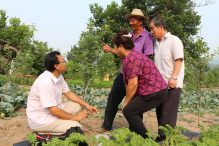China is one of the countries with the smallest per capita arable land in the world, and the traditional small-scale production has been difficult to adapt to the commercial development of agriculture in the context of economic globalization. However, to encourage the development of farmer organizations is an effective way to improve this situation.
With the support of the MTCP2 project, Agricultural Management Institute of China (AMI) has provided professional guidance and consultant services to Chinese farmers’ cooperatives for 6 years. More than tens of thousands of cooperatives participated in the technical training, policy dialogue, production and marketing docking and other activities which were organized by AMI, and their development capacity has been significantly improved as a result.
“I have benefited a lot from participating in activities organized by AMI. For instance, I learnt not only practical planting technology from the ‘Farmers’ Cooperatives Leaders Capability Building Training’, but also skills to enhance the product value.Now we have built up our own apple brand, which greatly boosted the prices of farmer members’ product,” says Kou Hongyan, the leader of Good for Farmers Cooperative of Beijing.

AMI invited technical experts to give advises to farmer members of the coop 
Apple’s quality has been significantly improved 
Egg is another new product of the coop, and Ms. Kou exhibit their green eggs on the trade fair held by AMI 
Field training for farmer members of the coop 
Ms. Kou introduced the green egg on the live webcast that was carried out by AMI 
Ms. Kou was signing her name on the signature backplane of Farmers’ Forum 2016 held by AMI
The Medium Term Cooperation Program Phase 2 (MTCP2), a five-year capacity building program supported by International Fund for Agricultural Development (IFAD), Swiss Agency for Development and Cooperation (SDC) and European Union (EU), has been implemented in 19 countries across 3 sub-regions—Southeast Asia, South Asia, Pacific—engaging 1,544 sub-national farmer organizations with total membership of around 22 million women and men farmers. The funding support (total budget of $ 5 Million for whole duration of project across 19 countries) serves as a catalytic fund that will allow FOs to enhance their capacity to be effective channels of economic services to farmers. The program thus far have contributed to the formation of strong national platform of Farmers’ Organization with improved capacity to engage in policy processes and mobilize resources from mainstream agricultural development programs like extension services, credit and pre and post harvest facilities. the program also helped in transforming farmers association into commodity-based cooperatives to strengthen the role of the small-scale farmers within an inclusive and sustainable value-chain. The program is being implemented by the consortium Asian Farmers’ Association for Sustainable Rural Development (AFA) and La Via Campesina (LVC).

Comments are closed